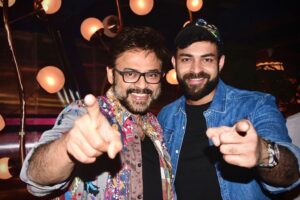This Laxman Utekar’s directorial is a delight for admirers of Maratha warriors. Just like the recent historicals, ‘Chhaava’ too has a strong undercurrent of saffronisation. Still the solid technical work coupled with the towering performances makes this a worthy big screen spectacle.
Chhaava (Hindi), 14-02-2025, Historical drama , 2 hours 41 minutes, U/A, Theatre
- Main Cast: Vicky Kaushal, Rashmika Mandanna, and Akshaye Khanna
- Director: Laxman Utekar
- Producer: Dinesh Vijan
- Music Director: AR Rahman
- Cinematography: Saurabh Goswami
- Rating: 3.5/5
In the last few years, Hindi cinema has seen a huge increase in the Hindutva influx, this doesn’t just pertain to the numerous war dramas, but this list also includes historical fiction based on the wars involving the Hindu kings, particularly the Rajput and Maratha warriors.
Very good examples of these are Sanjay Leela Bhansali’s Padmavaat (2018) and Om Raut’s Tanhaji (2020). In these films, the Muslim rulers are presented as merciless invaders from whom the Hindu nation should be saved.
Laxman Utekar’s first attempt at historical fiction also treads on the same path. After directing a slew of feel-good movies like Luka Chuppi (2019) and Zara Hatke Zara Bachke (2023) the cinematographer turned director takes an extremely different path from his previous works.
Synopsis
Chhaava meaning a lion cub is based on a novel of the same name written by Shivaji Sawant. The book covered the life and times of the very noted Maratha warrior Chhatrapati Sambhaji.
It’s hard to say what percentage of Chhaava is based on its original source material and how much fiction Laxman Utekar has added. but the movie does a very fine job of capturing the bravery of Chhatrapati Sambhaji managing to make the viewers feel for the man particularly if you are an admirer of Maratha warriors.
In simple terms, the core plot of Chhaava focuses on the events which transpired from 1680 to 1689, a period marked by the relentless pursuit of Mughal emperor Aurangzeb (a fabulous Akshaye Khanna).
The movie celebrates the valour of Chhatrapati Sambhaji (an outstanding Vicky Kaushal) in fighting against the troops of Aurangzeb. Rashmika Mandanna plays Maharani Yesubai— a very important pillar of support for Sambhaji.
Vicky Kaushal as Sambhaji
Chhaava works largely due to the emotional depth brought by Laxman Utekar. He and the screenplay writers don’t just depict Sambhaji as a fierce warrior but also reveal a vulnerable side to him.
There is a palpable sense of grief in the way Sambhaji speaks about missing his mother’s love and a recurring nightmare involving his father. Some of the dialogues effectively convey the brutalities of war, where countless lives are lost.
As Sambhaji, Vicky Kaushal fully embodies the role, delivering a top-notch performance. With this role, Vicky once again proves why he is a versatile actor, able to adapt to various genres, whether it’s the light-hearted Bad News or the more emotionally intense roles in Sardar Udham Singh and Chhaava.
Vicky shines the most in scenes where he portrays the psychological toll endured by a warrior king. The torture sequence involving Sambhaji is another standout moment where Vicky excels.
While the historical accuracy of these moments may be debatable, the way Vicky portrays Sambhaji’s fighting spirit, even while being physically tormented by Aurangzeb, creates an emotional connection with the character.
Performances
Akshay Khanna as Aurangzeb makes for more than a worthy tormentor. While there is no denying the amazing prosthetic work Akshay Khanna with his acting also makes the part memorable.
Thankfully there are no unnecessary theatrics; Akshay invokes terror with just his demeanour and piercing gaze. He excels in showcasing Aurangzeb’s huge hunger for power.
Rashmika Mandanna as Yesubai plays a strong partner in the same mould as her last outing Pushpa 2. She delivers a fine performance perfectly showcasing the inner strength of a warrior’s wife. A particular mention must be made of her act in the portions following Sambhaji’s capture.
Vineet Kumar Singh as Kavi Kalash shines the brightest among the supporting cast. He plays his part with a lot of warmth. The friendship between Sambhaji and him gives the movie some of its best moments.
Strong technical aspects
Among the strong aspects of Chhaava, the technical department deserves special mention. The fight sequences in the second half are a delight, especially for those who enjoy rustic action. There are numerous instances of the Marathas outsmarting the Mughals using guerrilla tactics. The way these ambush sequences unfold with surprise attacks resembles a gripping chess game.
Cinematographer Saurabh Goswami delivers high-quality work, successfully capturing both the grand scale and intense action set in the forests. Special mention should also be made of the scenes following the destruction of the war, which are staged realistically.
AR Rahman’s background score and music complement the film well. The tune “Aaye re toofan” serves as a powerful war anthem with a touch of Maharashtrian folk. On the other hand, “Jaane Tu,” a romantic number, perfectly captures the understated romance between Vicky and Rashmika.
A major flaw in Chhaava is its core plot, which suffers from a significant hangover of clichés found in numerous films set in the same historical context.
Additionally, the film doesn’t break new ground in its portrayal of Muslim characters. The heavy emphasis on the concept of Swarajya, along with the lack of subtlety in the dialogues surrounding it, can test the audience’s patience.
Final take
To sum it up Chhaava works as a big-screen spectacle, especially for fans of Vicky Kaushal and those who like stories of brave Maratha warriors.
(Views expressed here are personal.)
https://thesouthfirst.com/entertainment/chhaava-movie-review/




























